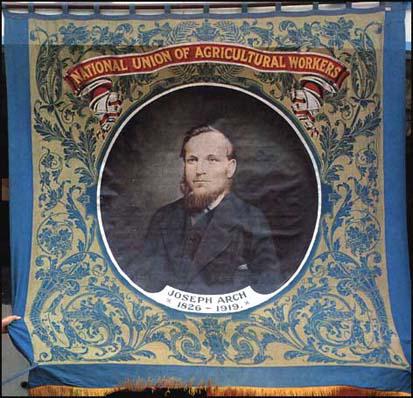Agricultural Labourers Union
In 1833 a small group of farm labourers in a village in Dorset called Tolpuddle attempted to form a branch of the Agricultural Labourers Union. Its six leaders were arrested and charged under the 1797 Unlawful Oaths Act. Found guilty they were sentenced to seven years' transportation to Australia.
Workers were shocked by the severity of the sentences and it was not until 1866 that an organised attempt was made to combine when the Agricultural Labourers Protection Association was formed in Kent. As labour was scarce at that time, the men were able to get their wages raised. Similar organizations were formed in Buckinghamshire, Herefordshire and Hertfordshire.
In March 1872 a meeting was held in Wellsbourne, Warwickshire and it was decided to unite these different agricultural unions. The delegates elected Joseph Arch, a farm labourer and Methodist lay preacher as their leader. Officially established in May, 1872, within two years the National Agricultural Labourers' Union had over 86,000 members, over one-tenth of the farm work force in Britain.
A prolonged strike in 1874 drained the union of funds and membership had declined to 4,254 by 1889. However, the successful London Dock Strike inspired the agricultural workers to try again to develop a strong union. This time they were able to maintain the union's growth and by 1919 the National Union of Agricultural Workers had over 100,000 members.

Primary Sources
(1) Henry Snell, Men Movements and Myself (1936)
Another abiding memory concerns the tireless industry of these agricultural workers. I doubt whether men and women ever worked harder, and I do not believe that necessary and honourable toil was ever more inadequately rewarded. They had no recreation beyond a perhaps weekly and half-ashamed visit to the public house, or an occasional social event at one of the local chapels.
If the position of the agricultural labourer today is an improvement upon the prevailing fifty years ago, it is in no small degree due to the organization started by Joseph Arch. The farm labourer today enjoys the full rights of British citizenship; he can take part in the local or national government of his country; he is, in so far as he is organised, a part of the labour movement; his social status has been raised; he is entitled to receive compensation for accidents; he has the consoling assurance of the old-age pension; he enjoys some little improvement in housing and sanitation, medical treatment, and sick pay for himself, though not for his wife and children.
